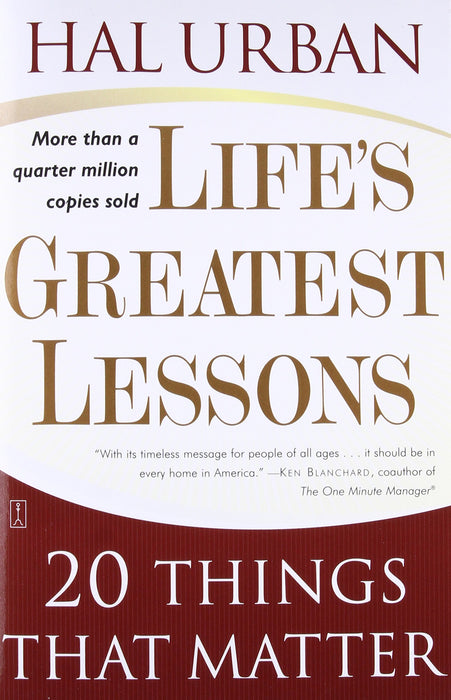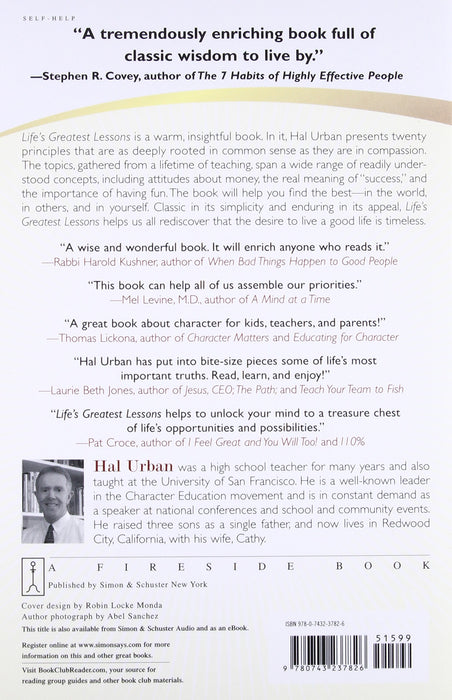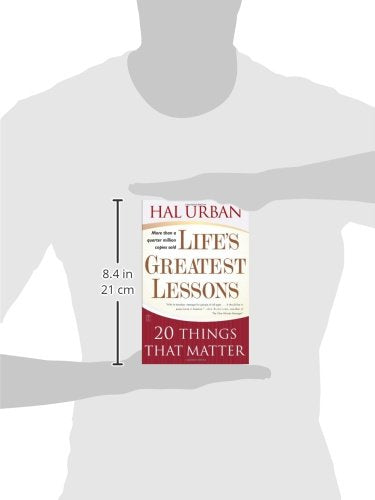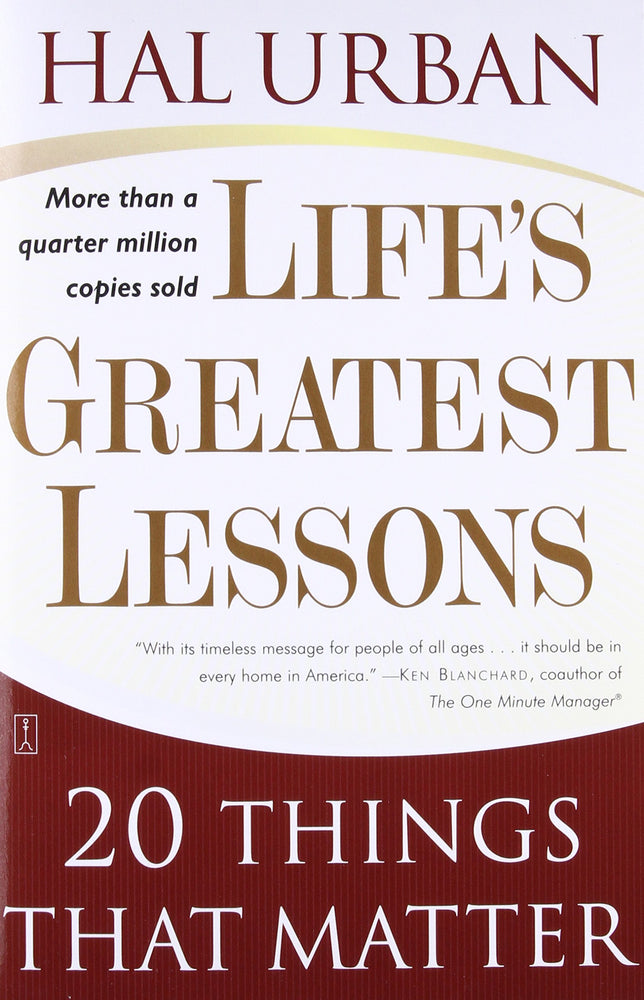



Life's Greatest Lessons: 20 Things That Matter
Paperback:
Publisher: Touchstone
ISBN 10: 074323782X
ISBN 13: 978-0743237826
Hardcover:
Publisher: Fireside
ISBN 10: 0743274172
ISBN 13: 978-0743274173
With more than a quarter million copies sold, award-winning teacher Hal Urban outlines twenty lessons that answer timeless questions about how to make the most of your life.
Life’s Greatest Lessons is a wise, wonderful book. In it, Hal Urban, a parent and an award-winning teacher, presents twenty principles that are as deeply rooted in common sense as they are in compassion. The topics, gathered from a lifetime of teaching both children and adults, span a wide range of readily understood concepts, including attitudes about money, understanding the real meaning of “success,” and the importance of having fun. The book will help you find the best—in the world, in others, and in yourself. Classic in its simplicity and enduring in its appeal, Life’s Greatest Lessons helps us all rediscover that the desire to live a good life is timeless.
From Publishers Weekly
Urban, a psychology Ph.D. specializing in "peak performance," draws on his own life experiences, wisdom imparted by his mentors and basketball coaches, observations of high school and college students, and the writings of other self-help gurus like Stephen Covey and M. Scott Peck to compile this catechism of conventional truisms. According to Urban, lifes great lessons are exactly what you always dreaded theyd be (theyre also his chapter titles): life is hard and not always fair; theres no substitute for hard work; you have to give up something to get something. Although slightly disdainful of the hug-happy self-esteem movement, Urban does insist that we all have a potential to live up to. Fortunately, since "attitude is far more important than intelligence, education, special talent, or luck," with enough positive thinking success is virtually assuredas long as we buckle down, set goals and stick with them, manage our time efficiently and find Jesus Christ or some other kind of spiritual content to nourish our lives. Urban is an ex-high school teacher, a self-admitted former "growth junkie" and a leader of the "character education" movement, and is thus awash in good lessons; his prose, though, tends toward the bland and platitudinous, which may make the lessons hard for some to swallow.
Copyright 2003 Reed Business Information, Inc.
Review
Rabbi Harold Kushner author of When Bad Things Happen to Good People A wise and wonderful book. It will enrich anyone who reads it.
Ken Blanchard coauthor, The One Minute Manager and Whale Done! With its timeless message for people of all ages, this book is going to become a classic. It should be in every home in America.
Stephen R. Covey author of The 7 Habits of Highly Effective People A tremendously enriching book full of classic wisdom to live by.
Mel Levine, M.D. author of A Mind at a Time This book can help all of us assemble our priorities.
Thomas Lickona author of Educating for Character A great book about character for kids, teachers, and parents!
Laurie Beth Jones author of Jesus, CEO; The Path; and Teach Your Team to Fish Hal Urban has put into bite-size pieces some of life's most important truths. Read, learn, and enjoy!
Pat Croce author of I Feel Great and You Will Too! and 110% Life's Greatest Lessons helps to unlock your mind to a treasure chest of life's opportunities and possibilities.
About the Author
Hal Urban was a high school teacher for many years and also taught at the University of San Francisco. He is a well-known leader in the Character Education movement and is in constant demand as a speaker at national conferences and school and community events. He raised three sons as a single father and now lives in Redwood City, California, with his wife, Cathy.
Excerpt. © Reprinted by permission. All rights reserved.
Introduction
I Wrote This Book
for Four Reasons
1. Because We're Never Too Young or Too Old to Learn Life's Greatest Lessons...and the Time Is Always Right
I was a teacher for thirty-five years and loved virtually every minute of it. I had the best of all worlds -- I taught kids in a public high school, adults in a Jesuit university, and spoke often to children at the elementary- and middle-school levels. I discovered long ago that regardless of age, people are eager to learn when it means understanding life more deeply and living it more fully. The letters and e-mails I receive from young children, teenagers, and adults confirm this on an almost daily basis.
Saint Ignatius Loyola, one of the world's greatest educators, once said that we only learn when we're ready to learn. In my lifetime, I've never experienced a period like the present in which so many people are not only open to learning, but also to re-examining their values and priorities. After enjoying a sustained period of unprecedented technological and economic advancements, our world has been shaken. The "dot-com" phenomenon imploded; the stock market and the economy took a nose dive; the events of September 11, 2001, both grieved us and reminded us of our vulnerability; and the corporate scandals of 2002 further shocked and dismayed us.
As one who's studied and taught history for many years, I know that tough times ultimately bring out the best in us. When people start asking questions about what's really important, they usually find the right answers. I'm pleased and honored that my book is helping the process.
2. Because They Don't Teach "How Life Works" or "What Is Essential" in School
Our schools, for the most part, do a great job. From first grade through graduate school, they offer a multitude of courses which result in increased knowledge and valuable skills. But there's something missing in the curriculum. We don't teach our students about life itself, about how it works or about what's essential. Never has there been a greater need for that.
We need someplace other than the proverbial "school of hard knocks" to acquire the right tools for succeeding in life. We need help in developing the attitudes and skills necessary to establish satisfying relationships, to set and achieve personal goals, and to enjoy feelings of self-worth.
As an educator, I felt this need for many years. But my pleas fell on deaf ears. Administrators were more concerned with test scores and budgets. Helping our students develop into good human beings didn't seem to be the school's responsibility. So I wrote this book to fill a void, to help us and our kids understand what's important, what good character is, and what it means to be successful in life.
3. Because Most of Us Need Help in Discovering How Good We Can Be
A few years ago, while attending a conference, I heard a psychologist say that by the time a person reaches the age of eighteen, he or she has been put down more than a hundred thousand times. I don't know how he came up with that figure, but it wasn't surprising. The truth is: we do get put down too much. It starts at an early age, comes from a variety of sources, and continues well into adulthood. In addition, the news media tells us every day what's wrong with the world and its people. This daily barrage of negatives takes its toll. The more frequently we hear something, the more likely we are to believe it.
It's not my purpose to examine why this happens, but simply to point out that it's one of the unfortunate truths about life. I wrote this book because I think we need help in focusing on the other side of humanity. I happen to believe that the overwhelming majority of people in the world are law-abiding, loving, and caring. They just don't get any publicity for it. Being good doesn't make the news. I also believe that most of us sell ourselves short. We have good qualities we're unaware of, have inner resources we haven't discovered, and have opportunities we never dreamed of. I hope this book brings out some positives in a world that seems to dwell on negatives. Finding the good in life can be one of our greatest joys.
4. Because Old-fashioned Truth Never Goes out of Style...Even with a New Generation
About a year before I wrote the first draft of this book, I gave a talk called "The Real Meaning of Success" to a group of college students. I began by pointing out some of the messages we get bombarded with constantly. I wanted them to know that my message would be quite the opposite. So I started by telling them what I didn't have: I had no "secrets" of success, no "magic formula" for complete happiness, no "amazing new techniques" for attaining the American Dream, no "quick and easy" way to become rich and powerful, and no "unique" method for getting everything we want.
Instead, I spoke that day about such time-honored values as respect, kindness, honesty, appreciation, desire, hard work, commitment, and just being a good person. My point was that there's no shortcut, no easy way, and no new method for achieving real success. It still has to be earned.
I was both surprised and pleased that so many of them stayed afterward. One of them said, "You know, you didn't really say anything I hadn't heard before, but you put it together in such a way that it made more sense. You really shed new light on some old truths." Then an elderly faculty member who was standing nearby said, "Thanks. We all need to be reminded about what's really important." Here were a young man just starting college and an older man nearing the end of his career telling me the same thing. Boy, did I love those two! They helped me decide that I had to write this book.
About the 20 Things
Why twenty? There's no profound reason. Probably because thirty is too many and nineteen doesn't sound right. Twenty just happened to be a nice round number that fit with what I had to say. I don't claim they're the only twenty things we need to know, just that they're some of the most valuable. They're twenty things I wish I'd known when I was younger. It wasn't until I was in my late thirties that I figured out how life works. Maybe these twenty things will help someone else who's still trying to figure it out. Actually, we need to do more than simply understand. To know them is one thing; to apply them is quite another. As an ancient Chinese proverb tells us:
I hear...and I forget
I see...and I remember
I do...and I understand
Copyright © 1992, 1997, 2000, 2003 by Hal Urban
